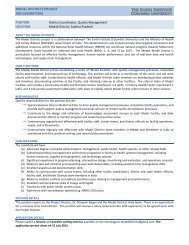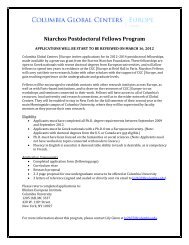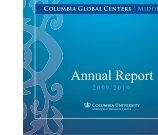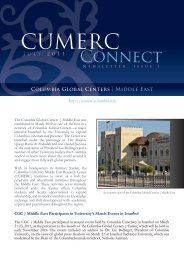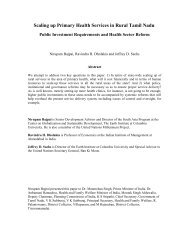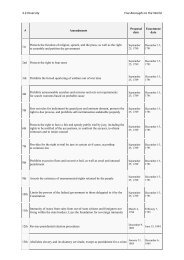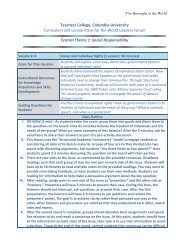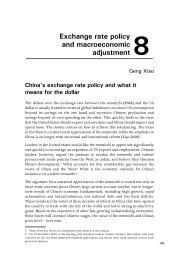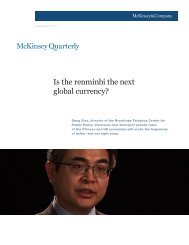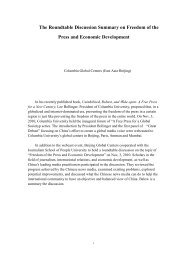Annual Report 2010 | 2011 - Columbia Global Centers
Annual Report 2010 | 2011 - Columbia Global Centers
Annual Report 2010 | 2011 - Columbia Global Centers
You also want an ePaper? Increase the reach of your titles
YUMPU automatically turns print PDFs into web optimized ePapers that Google loves.
on creating partnerships and fundraising relationships, and the experience of the Amman Center.<br />
On March 23, a discussion on the <strong>Global</strong> <strong>Centers</strong> was held at Boğaziçi University, with welcoming remarks by its<br />
President, Kadri Ozcalidiran. Following opening remarks by President Lee Bollinger, a panel discussion, “How Do<br />
We Teach Our History? Comparative Issues and Perspectives” ensued. Panelists included: Fikret Adanır, Professor at<br />
Sabancı University, Elazar Barkan, Professor of International and Public Affairs and Director of the Institute for<br />
the Study of Human Rights and SIPA Human Rights Concentration at <strong>Columbia</strong> University, and Edhem Eldem,<br />
Professor and Chair of the Department of History at Boğaziçi University. The discussion was moderated by Karen<br />
Barkey, Professor of Sociology and History and Chair of the Faculty Steering Committee for the <strong>Columbia</strong> <strong>Global</strong><br />
<strong>Centers</strong> | Turkey.<br />
A second panel discussion entitled, “The Role of Policy <strong>Centers</strong> (Think Tanks) on Policy Making”, was moderated<br />
by Kenneth Prewitt, Vice President for <strong>Global</strong> <strong>Centers</strong> and Carnegie Professor of Public Affairs at <strong>Columbia</strong><br />
University. Panelists included: Hakan Altınay, Senior Fellow at the Brookings Institution, Lee Goldman, Executive<br />
Vice President for Health and Biomedical Sciences and Dean of the Faculties of Health Sciences and Medicine at<br />
<strong>Columbia</strong> University, and Kemal Kirişci, Professor of Political Science at Boğaziçi University.<br />
Workshop on Religious Law, Local Practice, and <strong>Global</strong> Debates<br />
about Muslim Women’s Rights<br />
“Who’s Afraid of Shari’a Law?” is a project spearheaded by Lila Abu-Lughod, the Joseph L. Buttenwieser Professor of<br />
Social Science at <strong>Columbia</strong> University and Co-Director of the Center for the Critical Analysis of Social Difference<br />
(CCASD), which seeks ways to move beyond the polarized debates about women’s rights in Muslim societies. In<br />
the past two decades, the application of Islamic law to the regulation of women’s everyday lives has generated great<br />
controversy, but has also inspired innovative thinking by feminists.<br />
As part of this project, and in collaboration with Professor Abu-Lughod and CCASD, the <strong>Columbia</strong> University<br />
Middle East Research Center hosted a workshop on April 8-10 that focused on women’s rights, family law, and<br />
the topic of “consent”—its meanings, its potential, and its politics. The workshop brought together a group of<br />
international scholars and practitioners who work in the fields of law and legal reform across the Muslim world,<br />
including Iran, Egypt, Palestine, India, Nigeria, Indonesia, Senegal, and Morocco. The workshop helped enable the<br />
development of a more nuanced assessment of the place of Islamic law in today’s world, and is the first in a series<br />
of intensive workshops that will be held on this topic.<br />
Professor Lila Abu-Lughod convenes a workshop on religious law



